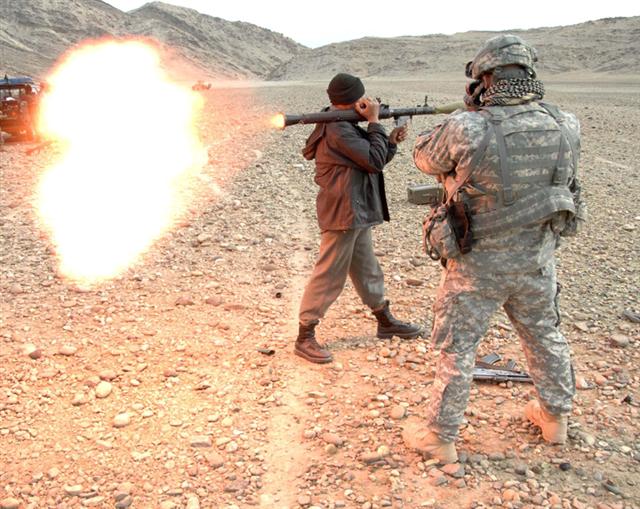As CIA Director Leon Panetta’s made a public assessment this weekend that the U.S. “has driven al-Qaida into hiding and undermined its leadership (Flaherty, AP),” comes news that Nine Years On, Only 41 Percent of Americans Believe US Can “Win” in Afghanistan.
It’s unclear when al-Qaida has not been in hiding? Even more murky is what exactly al-Qaida is now-a-days as we apparently undermine its leadership with some regularity.
Whether Afghanistan remains the graveyard of empires, America’s quagmire, or a huge, venting blow-back operation, one reality is clear: This nine-year war is a humanitarian disaster, a fact of no small moment for the people who call Afghanistan home.

By Brad Knickerbocker
Until recently, the nine-year conflict in Afghanistan had become “the forgotten war” for many Americans – a complaint increasingly heard among US troops there.
But this week’s sacking of Gen. Stanley McChrystal as US commander puts Afghanistan – and especially how the fight against the Taliban is going – squarely back into public thought and concern.
Most Americans agree with Obama that McChrystal had to go, polls show. But they’re far less supportive of the conflict itself, weary of what’s become the longest war in US history.
A recent Rasmussen Reports telephone survey of likely voters finds that just 41 percent “now believe it is possible for the United States to win the nearly nine-year-old war in Afghanistan.” More to the point, a plurality of 48 percent now say ending the war in Afghanistan is a more important goal than winning it.
Meanwhile, 53 percent of those polled by Newsweek disapprove of how Obama is managing the war – a sharp reversal since February when 55 percent supported Obama on Afghanistan and just 27 percent did not. (Put another way, the percentage of Americans who disapprove of Obama’s Afghan policy has nearly doubled in four months.)
The same Newsweek poll finds that “46 percent of respondents think America is losing the war in Afghanistan (26 percent say the military is winning). A similar plurality think the US is losing the broader war on terrorism (43 percent vs. 29 percent)…”
Part of this has to do with the nature of a counterinsurgency (COIN) effort – a phrase and acronym which has been around at least since the early days of Vietnam. Even when it works, counterinsurgency can take years. And the two most recent major examples – France in Algeria and the United States in Vietnam – hardly worked. Hearts and minds must be won, not only in the war zone, but at home as well.
In naming Gen. David Petraeus as McChrystal’s replacement, President Obama emphasized that there would be no change in war policy or strategy. The goal is still to defeat the Taliban, develop Afghan army and police forces, and seriously consider withdrawing US forces in little more than a year from now.
But as Tony Karon at time.com points out, “the mounting difficulties facing that strategy were certainly a primary driver of the internecine backstabbing that was laid bare by the Rolling Stone article that got McChrystal fired.”
“Violence is on the increase, the Taliban is hardly in retreat, both Pakistan and Afghan President Hamid Karzai continue to hedge their bets, and NATO allies want out,” Karon writes. “The idea that the war can be handed over to Afghan security forces anytime soon appears fanciful. And prospects for turning things around by next summer, the administration’s putative target date to begin drawing down, are looking grim.”
Unsettled public opinion on the conflict in Afghanistan – where US combat casualties have been increasing – is reflected in Congress, which must approve war funding.
“The president and congressional critics, long on a collision course over the war in Afghanistan, are hurtling ever faster toward each other since the ouster of Gen. Stanley McChrystal, and doves on Capitol Hill are feeling a little tougher right now,” reports Politico.
Wall Street Journal columnist Peggy Noonan predicts that conservatives may “start to peel off” as well.
“Not Washington policy intellectuals but people on the ground in America,” she wrote this week. “There are many reasons for this. Their sons and nephews have come back from repeat tours full of doubts as to the possibility of victory, ‘whatever that is,’ as we all now say.”
Noonan continued: “The other day Sen. Lindsey Graham, in ostensibly supportive remarks, said that Gen. David Petraeus … ‘is our only hope.’ If he can’t pull it out, ‘nobody can.’ That’s not all that optimistic a statement.”
ATTENTION READERS
We See The World From All Sides and Want YOU To Be Fully InformedIn fact, intentional disinformation is a disgraceful scourge in media today. So to assuage any possible errant incorrect information posted herein, we strongly encourage you to seek corroboration from other non-VT sources before forming an educated opinion.
About VT - Policies & Disclosures - Comment Policy



